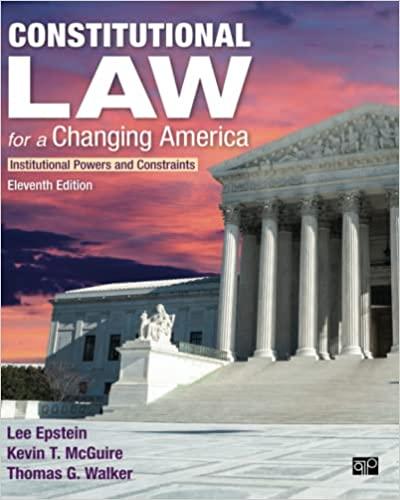Question
Question10: In Olley v Marlborough Court Ltd (1949), what led the court to decide that the exclusion clause found in the hotel room was not
Question10: In Olley v Marlborough Court Ltd (1949), what led the court to decide that the exclusion clause found in the hotel room was not binding on the couple who checked into the hotel?
A. The court held that the exclusion clause was not binding on the couple because it was introduced after the contract had been made at the reception; the couple only became aware of the term when they went up to their room.
B. The court held that the exclusion clause was not binding on the couple because it was considered to be a ludicrous term.
C. The court held that the exclusion clause was not binding on the couple because it would be against public policy that a hotel could escape liability for a breach of contract on its part.
D. The court was of the opinion that the hotel, having insurance, would be in a position to reimburse the couple for the valuables lost.
Question 11: In the tort of negligence, it is said that the defendant owes the plaintiff a duty of care under what is now termed as the 'neighbour principle' (Donoghue v. Stevenson). Which statement best describes this 'neighbour'.
A. "Persons nearby who are likely to be affected by my act or omission that I ought reasonably to have them in contemplation as being so affected when I am directing my mind to the acts or omissions which are called in question."
B. "Persons who are so closely and directly affected by my act or omission that I ought reasonably to have them in contemplation as being so affected when I am directing my mind to the acts or omissions which are called in question."
C. "Persons who are likely to be affected by my act or omission that I ought reasonably to exercise better judgement when directing my act."
D. "Persons who are so closely and directly affected by my act or omission that I ought reasonably to have warned them about being so affected when I am directing my mind to the acts or omissions so that precautions can be taken."
Question 12: Unlike a sole proprietorship or a partnership, a company is a separate legal entity, i.e. it is a separate person in its own right. What does this mean?
A. The sole proprietor and partner are personally liable for all the debts of the business, whereas the owners of a company can only be made liable for the debts of a business if it is reasonable that they should be liable.
B. The sole proprietor and partner are not personally liable for all the debts of the business, whereas the owners of a company are personally liable for any outstanding debts of the company.
C. The sole proprietor and partner are personally liable for all the debts of the business, whereas the owners of a company are liable only for transactions done with the full knowledge of all the members.
D. The sole proprietor and partner are personally liable for all the debts of the business, whereas the owners of a company are only liable up to the amount they have invested in the company.
Question 13: Which best describes the business relationship of parties who enter into a purely contractual relationship with each other without intending to set up a company, limited liability partnership, limited partnership or partnership? (
A. Directorship.
B. Shareholding.
C. Partnership.
D. Joint Venture.
Question 14: Which of the following is NOT a member's right?
A. The power to manage the company.
B. To enforce the constitution.
C. To attend meetings and vote.
D. To company information.
Step by Step Solution
There are 3 Steps involved in it
Step: 1

Get Instant Access to Expert-Tailored Solutions
See step-by-step solutions with expert insights and AI powered tools for academic success
Step: 2

Step: 3

Ace Your Homework with AI
Get the answers you need in no time with our AI-driven, step-by-step assistance
Get Started


